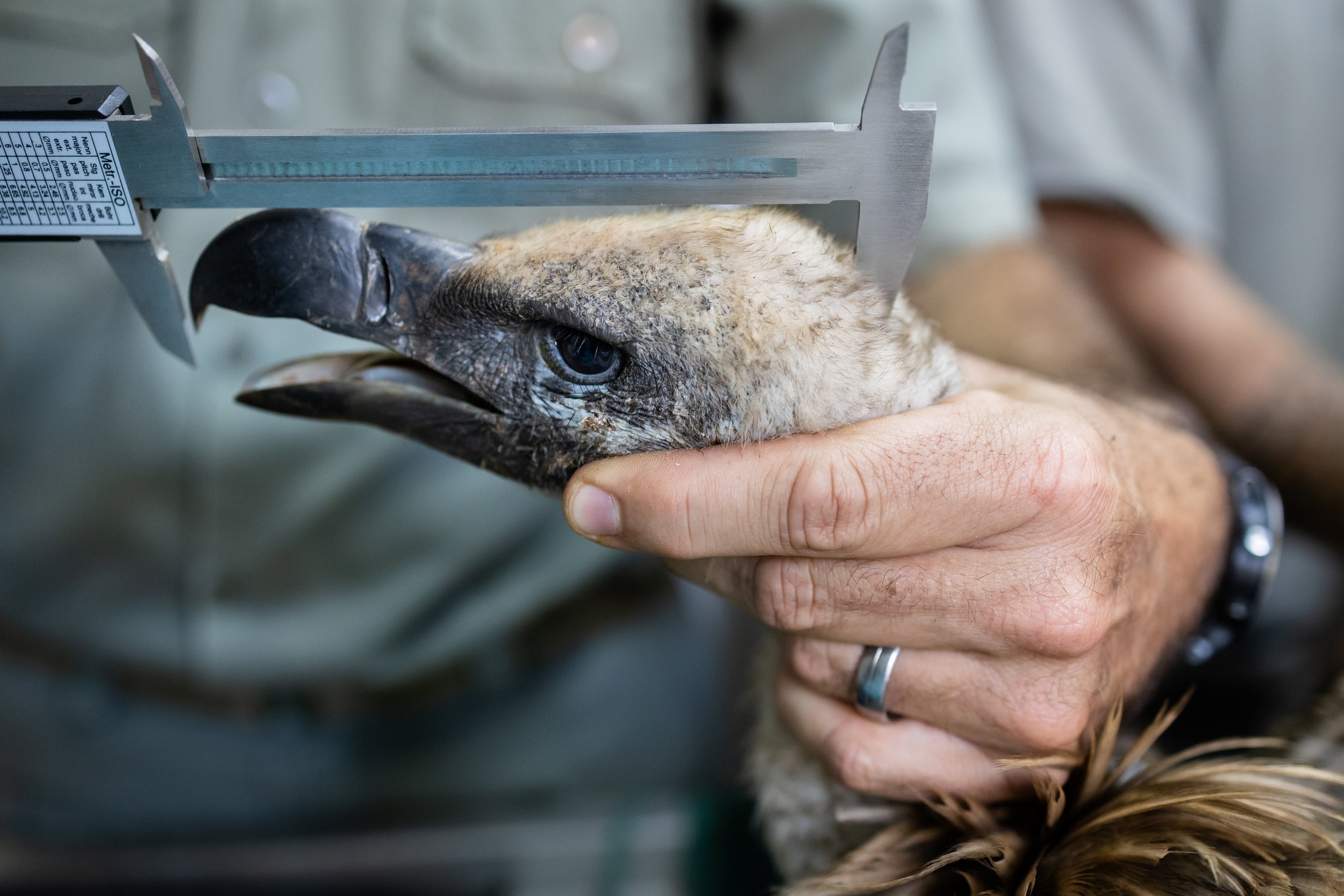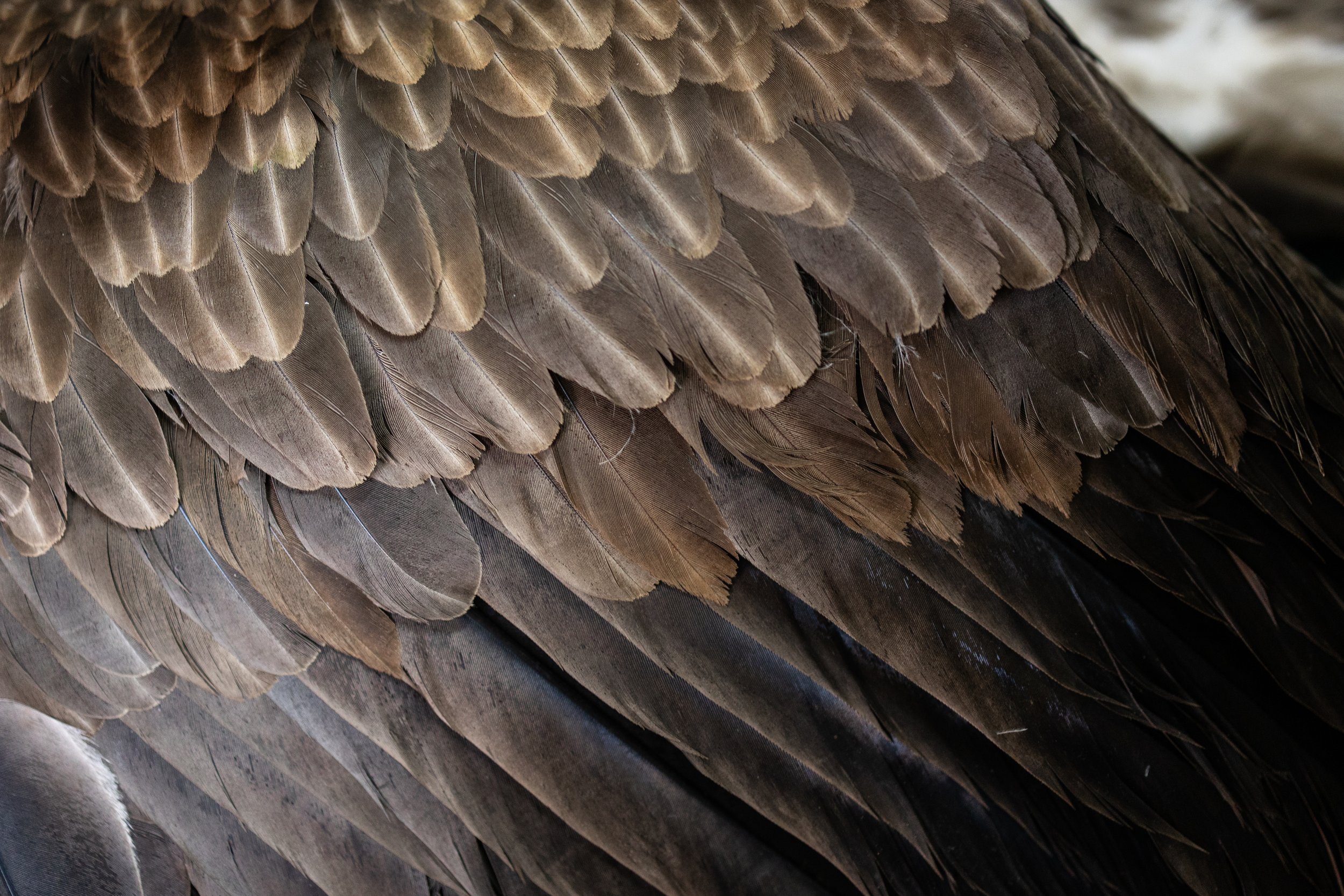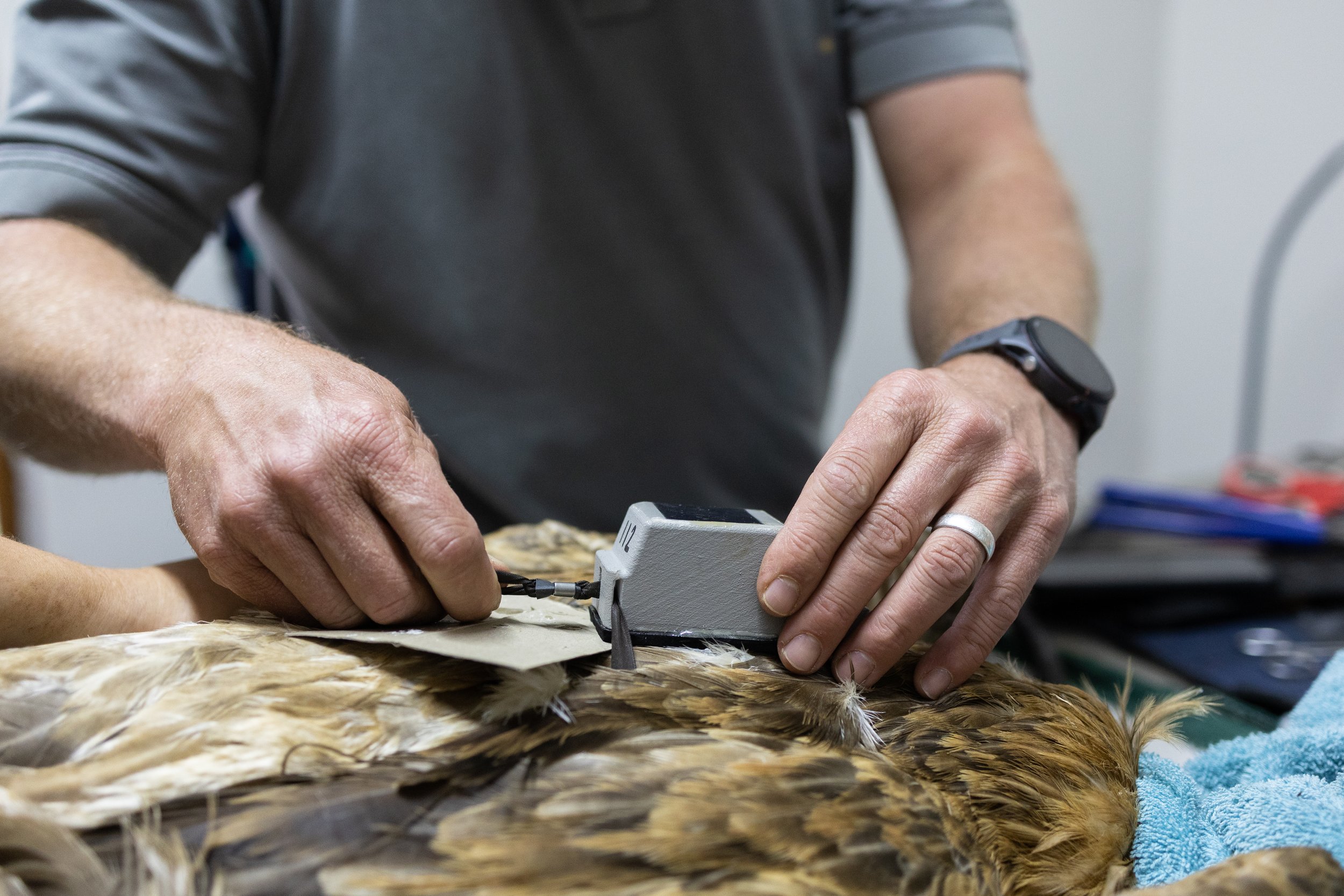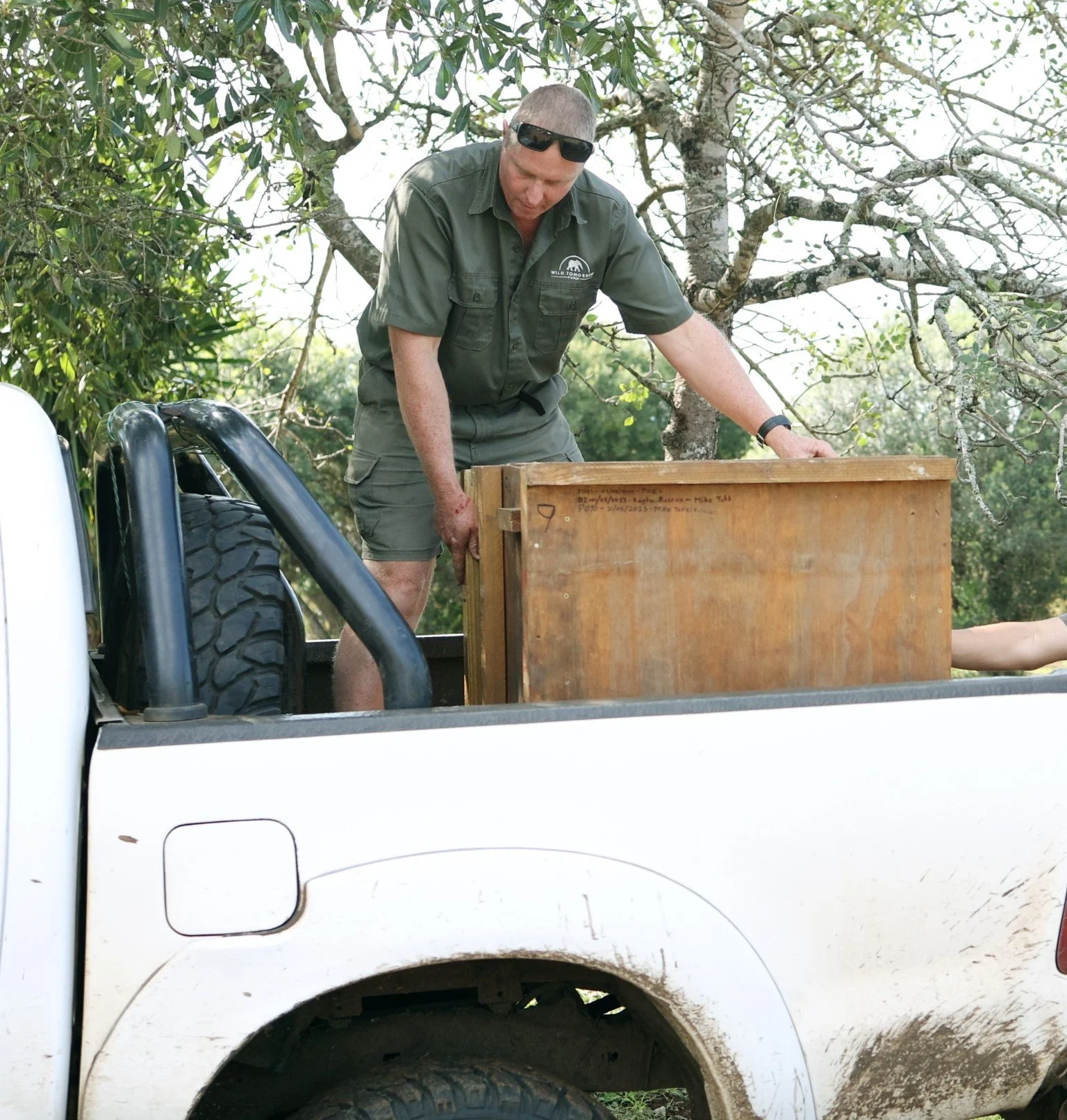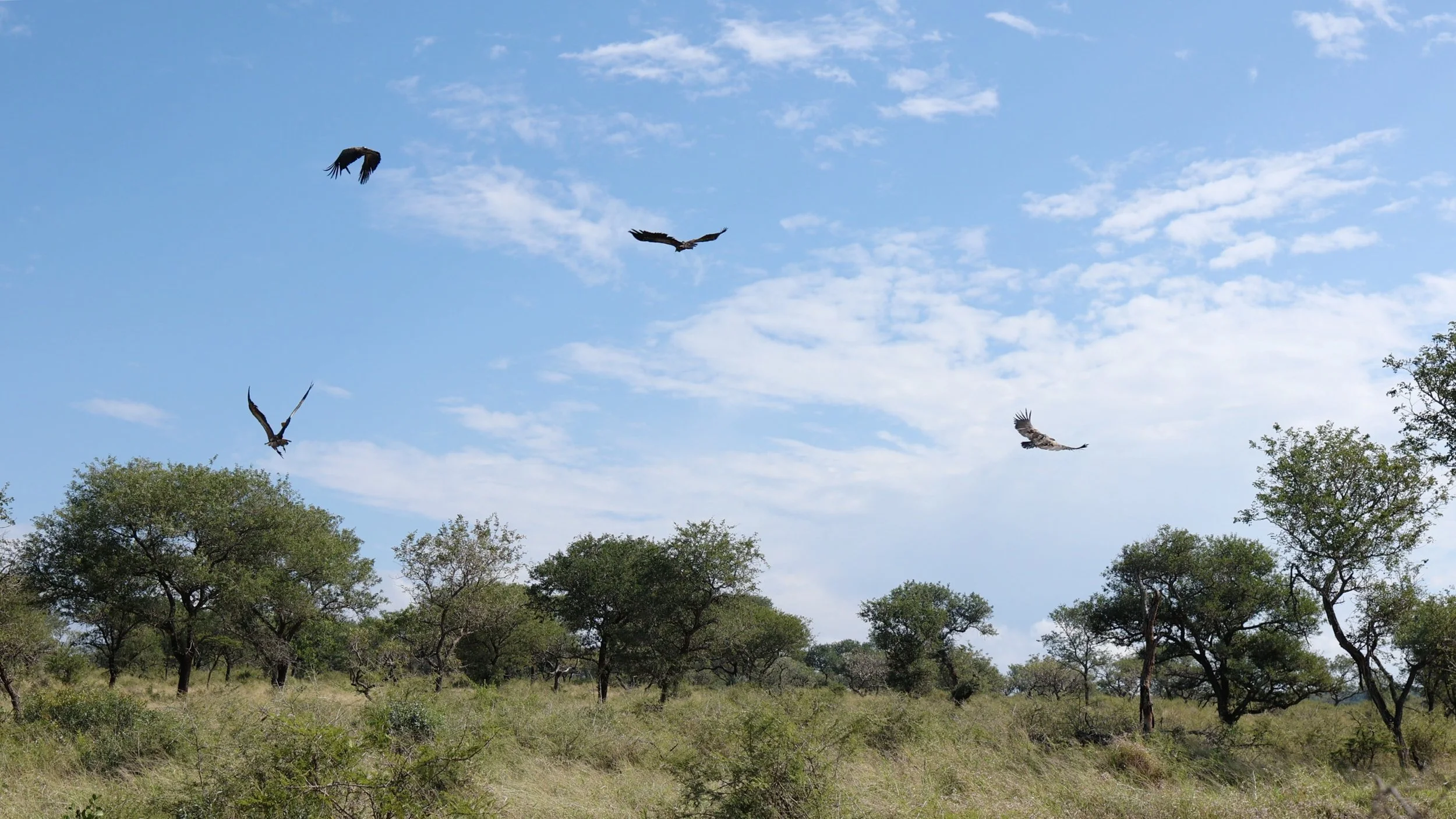VULTURE CONSERVATION IN KWAZULU-NATAL WITH WILDLIFE ACT
Wild Tomorrow recently funded 3 vulture GPS tracking units and joined Wildlife ACT for the release of 5 vultures at Manyoni Private Game Reserve! Read more about vultures and the threats they face, Wildlife ACT’s Vulture Conservation Programme, and these five rehabilitated individuals in our latest blog post below.
Two of the five White-backed Vultures released into the wild at Manyoni Private Game Reserve. Photograph by Chantelle Melzer.
Vultures who seem to have received a “bad rep”, often referred to as the ugly scavengers of the bush and frequently associated with death and decay, in fact, play a critically important role in the environments in which they live. Vultures provide the crucial, and sometimes overlooked, ecosystem service of cleaning up carcasses and other animal-derived organic waste, as well as abating the risk of pathogen spillovers to humans and other wildlife. This is fundamental for human health, the region’s economy and ecology, and the health of our climate.
There are six species of vultures that occur in Wild Tomorrow’s region of KwaZulu-Natal (KZN), and all are listed by the IUCN Red List of Endangered Species as either Endangered or Critically Endangered. Since 2004, there has been a 70% decline in breeding pairs of vultures. Wildlife ACT reports the estimated number of active breeding pairs in South Africa as:
African White-Backed Vulture (Gyps africanus): ~4000 breeding pairs (Critically Endangered)
Bearded Vulture (Gypaetus barbatus): ~50-100 breeding pairs (Near threatened globally - IUCN 2021)
Cape Vulture (Gyps coprotheres): ~4500 breeding pairs (Vulnerable - IUCN 2021)
Hooded Vulture (Necrosyrtes monachus): ~50-100 breeding pairs (Critically Endangered – IUCN 2021)
Lappet-Faced Vulture (Torgos tracheliotos): ~180 breeding pairs (Endangered – IUCN 2021)
White-Headed Vulture (Trigonoceps occipitalis): ~80-100 breeding pairs (Critically Endangered – IUCN 2021)
The biggest threat to the death and populations of vultures in KZN is poisoning. Vultures are intentionally poisoned for the illegal vulture trade and, in some cases, are poisoned as an unintended consequence of predator control. Other reasons we are seeing declines in vulture populations are habitat loss and degradation as well as electrocution and collision with power lines, and human disturbance.
Our conservation partners at Wildlife ACT have founded the Vulture Conservation Programme which aims to 1) stabilize populations and protect their habitats, 2) educate and involve the community in conservation, and 3) improve advocacy. Wildlife ACT is also an active member of Project Vulture, the Zululand Vulture Project, the Bearded Vulture Task Force, and the South African National Vulture Task Force.
To better understand the movement patterns of the various vulture species in the province of KZN, light-weight solar-powered GPS units, wing tags, and leg tags are placed on both adult and fledgling individuals. The data reported by the GPS units and the sightings recorded from the tags provide useful information that can help build on existing understanding and knowledge of the threats these vultures face and the areas they utilize most. The data also helps conservation managers to better protect these endangered birds and their habitats.
Wild Tomorrow was recently approached to cover the cost of 3 GPS units including daily data downloads through our friends at Wildlife ACT. We were delighted to step in and assist, thanks to funding from our partners at Biologists without Borders and our Most Needed Projects donors - the cost of each tag was R18,000 or about $1000 each.
In December of 2022, after a mass wildlife poisoning scene, five of the lucky African White-backed Vultures (who didn’t succumb to death by the poisoning) were captured and treated by Wildlife ACT’s Emergency Response Team before being transported to Raptor Rescue Rehabilitation Centre for further treatment. Despite the best efforts of all involved, one individual, unfortunately, did not survive. The four surviving birds were released together with another vulture that was found with a broken wing earlier in 2022. Together, the five rehabilitated vultures were fitted with uniquely identifiable patagial tags, leg rings, and GPS tracking units before their release. These tags and GPS units will enable the Wildlife ACT team to monitor their post-release movements, respond in case of an emergency, and assess the rehabilitation success.
The release of these five rehabilitated African White-backed Vultures took place on Manyoni Private Game Reserve and our very own Reserve Manager, Kevin Jolliffe, was lucky enough to be invited to join! After collecting the vultures from the rehab center, measuring, and aging the birds, it was time for them to be transported to the release site. He recounts, “These five White-backed Vultures were feisty individuals – you can tell that their rehabilitation process was done exceptionally well as they were completely wild, healthy, and fit. As they flew out of the transport boxes, they flew directly to join up with the flock of wild vultures flying nearby. It was an incredible experience to be a part of and I hope that Wild Tomorrow can assist Wildlife ACT’s Vulture Conservation Programme more in the future!”
Kevin Jolliffe, Wild Tomorrow’s Reserve Manager, assisting with the movement of the vulture crate on the day of the release. Photograph by Chantelle Melzer.
The rehabilitated and released White-backed Vultures. Photograph by Chantelle Melzer.
This release was made possible by the work done by the Zululand Vulture Project, Wildlife ACT, Ezemvelo KZN Wildlife, Raptor Rescue Rehabilitation Centre and Dr. Mike Toft. If you’d like to donate towards vulture conservation, head to www.WildlifeACT.com/donate or https://wildtomorrow.org/donate-most-needed
References:
All data as reported by Wildlife ACT, https://www.wildlifeact.com/about-wildlife-act/wildlife-species/vultures/



